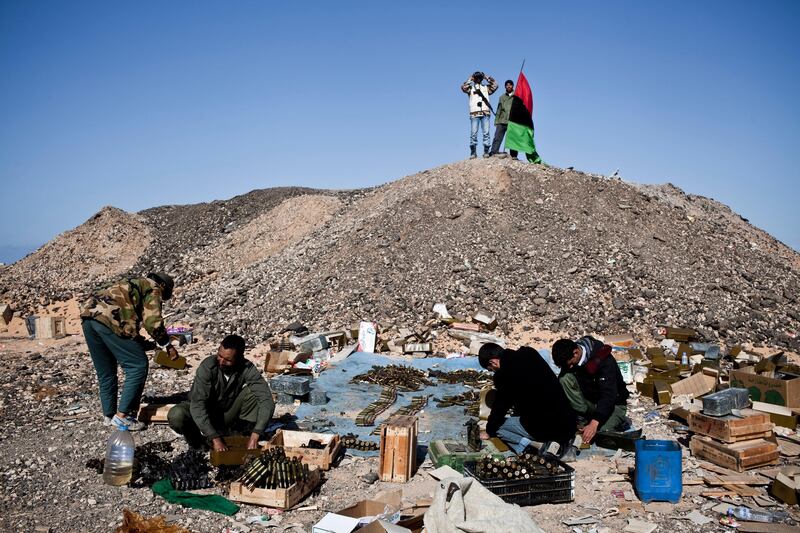WASHINGTON // The UN Security Council discussed imposing a no-fly zone against Libya behind closed doors tonight. While the 15-nation body has agreed to impose travel bans and asset freezes against Colonel Qaddafi and his cabal, council members are understood to be split over whether to take tougher action.
Britain and France are drafting a second resolution against Libya, but two other permanent veto-wielding members, Russia and China, have expressed concern over a no-fly zone. Lynn Pascoe, the UN undersecretary general for political affairs, said Libya was a "matter of huge concern" for members but would not comment on negotiations.
Britain and France had prepared a draft resolution that would provide an international mandate for a no-fly zone over Libya, as a bloody stalemate emerges in the fighting there.
Their efforts yesterday received an important boost from Gulf countries, which called on the international community to take stronger action.
"The Gulf Cooperation Council demands that the UN Security Council take all necessary measures to protect civilians, including enforcing a no-fly zone over Libya," the six-nation bloc said on Monday.
An international mandate will still take time, however. Russia has said it opposes direct foreign intervention, and it is not clear if China is ready to accept more forceful measures than the sanctions the Security Council agreed to last week.
Beijing said today it would urge countries "to settle the conflict and calm the situation through dialogue and other peaceful means", according a foreign ministry spokesperson.
China has not specifically opposed a no-fly zone, but the country has been traditionally reluctant for the international community to intervene in what it considers other countries' domestic affairs.
Washington also remains cautious even as Nato military planners met in Brussels to discuss a no-fly zone. The 28-member North Atlantic defence body said it had launched 24-hour air surveillance over Libya, and Ivo Daalder, the US ambassador to Nato, said the alliance could impose a no-fly zone by the end of the week if mandated to do so by the UN.
Jay Carney, the White House spokesman, on Monday said a range of options remained on the table, but added that the Nato meet should not be taken to mean that "the likelihood of further options being pursued [is] greater now".
In Tripoli, meanwhile, Saadi Qaddafi, claimed that should Muammar Qaddafi, his father and the Libyan leader, step down, Libya would be "engulfed in a civil war".
"The tribes are all armed, there are forces from the Libyan army and the eastern region is armed. The situation is not like Tunisia or Egypt," Saadi told Al Arabiyah TV. "If something happened to the leader, who would be in control? A civil war would start."
His comments came as fighting raged across the north of the country, where forces loyal to Colonel Qaddafi have engaged opposition fighters both in the west around Tripoli, the country's capital and Colonel Qaddafi's stronghold, and in the east, which is largely under opposition control.
Civilians were surrounded by regime forces in two western towns, Misrata and Zawiyah, and in the east warplanes hit the rebel-held oil terminal town of Ras Lanuf.
With all signs indicating that the fighting in Libya will be protracted and the UN warning that more then one million people have been displaced in the fighting so far, pressure for direct international intervention is likely to continue to grow.
Anders Fogh Rasmussen, the secretary general of Nato, insisted that Nato would not take any action without UN authorisation but added: "I can't imagine the international community and the United Nations would stand idly by if Qaddafi and his regime continue to attack their own people."
Barack Obama, the US president, said on Monday he wanted to "send a very clear message to the Libyan people that we will stand with them in the face of unwarranted violence and the continuing suppression of democratic ideals".
US officials are understood to have been in direct contact with Libyan officials around Colonel Qaddafi, reportedly in an attempt to see if they will remain loyal to the Libyan leader. But there is no sign yet of wavering from members of the Libyan leadership.
There is considerable resistance in the US to any direct military entanglement in Libya, as the US military tries to extricate itself from both Iraq and Afghanistan. Public opinion polls show that most Americans are against the US getting directly involved in domestic Arab affairs, and Robert Gates, the US defence secretary, last week warned against "loose talk" about a no-fly zone, adding that any such measure would necessitate an act of aggression against Libya.
The US military is concerned that it might have to put soldiers on the ground in yet another Arab country, a possible consequence of getting more deeply involved in the Libyan fighting.
"Everyone [in Washington] wants to avoid putting boots on the ground," said Anouar Boukhars, professor of Middle East and North Africa Studies at McDaniel College in Maryland.
Mr Boukhars, however, suggested that imposing a no-fly zone might alone succeed in shifting the balance of power in Libya and that the US should see such intervention in Libya as an opportunity to begin to correct America's image in the Middle East, which was shattered after the US invasion of Iraq in 2003.
Arab support, however, is necessary to provide diplomatic cover for any direct intervention in Libya, Mr Boukhars argued. Yesterday's GCC statement could therefore prove to be crucial in speeding up any decision on international intervention to end the fighting in Libya.
okari@thenational.ae






